BAFA © 2010. All material here is copyrighted. See conditions above. |
Elena Ostrer
painting, drawing, stage design, Russia.
|
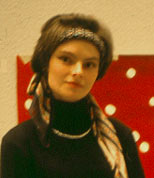 Elena Ostrer, 1994,
at Art Cologne, Germany.
|
Elena Ostrer, who lives and works in Moscow, studied set design and painting at the Moscow Academy of Fine Arts.
She exhibits regularly, sometimes with her husband Peter Nilov who is also an artist and set designer.
|
| 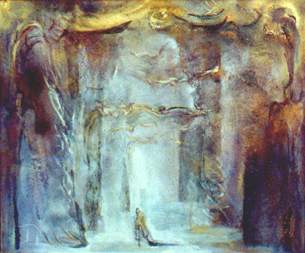
The set-design for Mozart's Opera, Don Giovanni, 2000,
painting by Elena Ostrer.
|
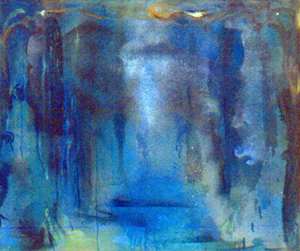
The set-design for Mozart's Opera, Don Giovanni, 2000,painting by Elena Ostrer.
|

Detail of the set-design for the puppet performance, The Half-Aldlzar in Rybinsk, 2000,
design by Elena Ostrer and Peter Nilov.
|
more to come...
|
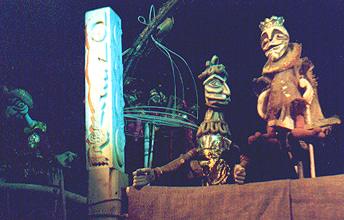
text to come...
|
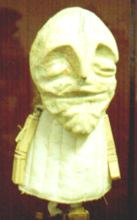
text to come...
|
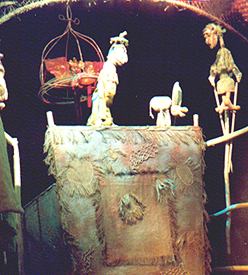
|
We have just finished the setting for a puppet theatre in the small town of Rybinsk. The play was based on a Russian folk tale, and we wanted to give it a sense of spirit which took a lot of work with the director. Before that we worked on the Puskin Project for an outdoor stage in a square near the Kremlin. The director there was a joy to work with for this 5 hour show. We made large puppet heads which the actors wore (one was 168 cm in length) along with statue-like constructions. The performance was a mixture of theatre and a game which involved the public.
Excerpt from a Letter, Arts Dialogue, February 2001.
|
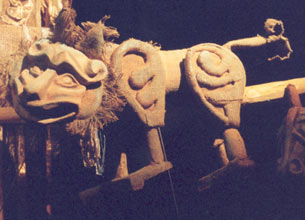 Excerpt from a Letter Excerpt from a Letter
I have been studying Shakepeare's vision and theatre as part of my studies in set design here in Moscow. He is one of the most popular playwright in Russia and we have the most poetical translations made by Boris Pasternak available to us, although it is safe to speak of the "Russian Shakespeare" differing markedly from the "English Shakespeare". His translations retain all of the original text but they are still interpretations and in way that relates strongly to Russia of the 1970's and '80's in my view. This was obvious when Vladimir Visotsky recently played Hamlet in the Nataganke Theatre. It has been fascinating to compare the translations with the originals of the seven plays that I have studied, although, in the end, I decided to use the original English text for the basis of my theatre designs. In my set designs, I aim to create a vision that corresponds as much as possible to Shakepeare's model of theatre as the symbol and model of the world (and the idea of the whole world as theatre).
I also made many designs for the play "The Common Miracle" by Evgeniy Schwarz, which is a comic fairytale about a magician in the Kartaten mountains who amuses himself with various tricks, such as turning a bear into a prince, who turns back into a bear on being kissed by a princess. The real story is aobut how the magician gives life to a fairytale through his actions, which to me, is parallel to the world of set design - a strange, beautiful and artifical world. While working on these designs, I used images of old mechanical toys, clocks and musical instruments as symbols for the man-made. I did not paint a mountain or a house, instead, I suggested these forms out of compositions of moving and painted mechanical animals and clocks, so that the set design itself was a mixture of the 'living' and the artifical.
Excerpt from a Letter, Arts Dialogue, June 1996.
|
- Photograph: Arts Dialogue, Arts Dialogue, November 2002
- Letter: Arts Dialogue, Arts Dialogue, February 2001
- Photographs: Buildings in Moscow for Susan Buck Morss' article: The City as Dreamworld and catastrophe, Arts Dialogue, March 1998
- Photograph: of a building in Moscow for Susan Buck Morss' article: The City as Dreamworld and catastrophe, Arts Dialogue, September 1997
- Letter: Arts Dialogue, Arts Dialogue, June 1996
- Letter: Arts Dialogue, Art & Culture in East Siberia and theatre in Moscow, Arts Dialogue, June 1995
- Translation: article on Ilya Artamonov, Arts Dialogue, December 1994
|

Arts Dialogue, Dintel 20, NL 7333 MC, Apeldoorn, The Netherlands
email: bafa@bahai-library.com
|
|







 Excerpt from a Letter
Excerpt from a Letter